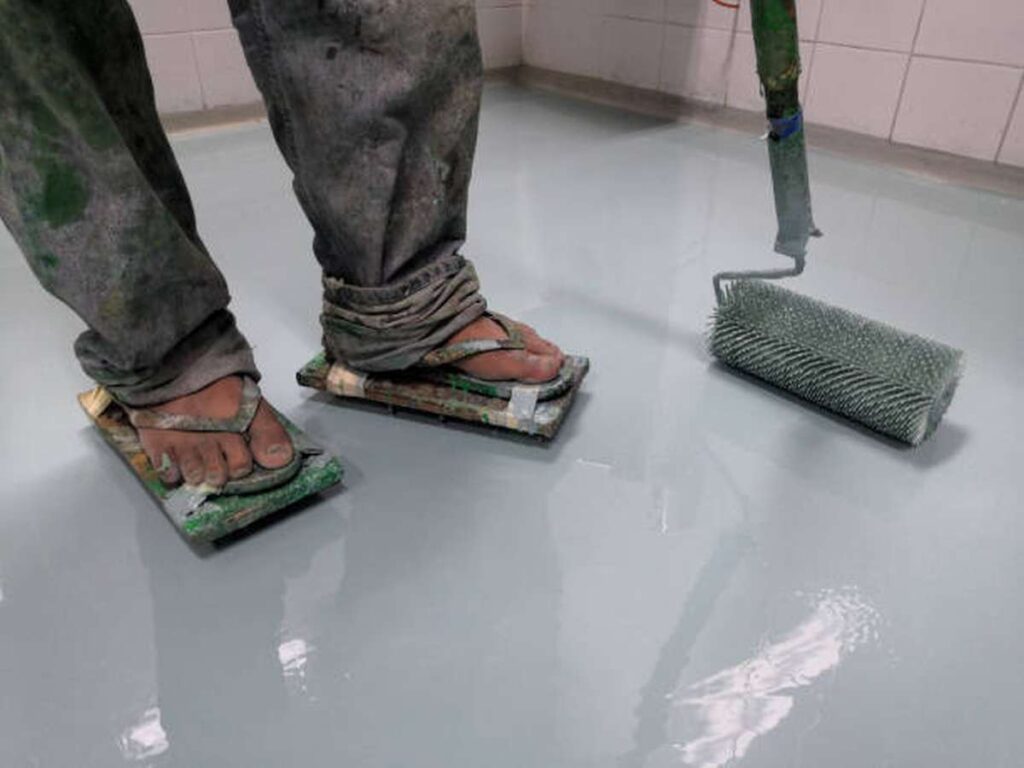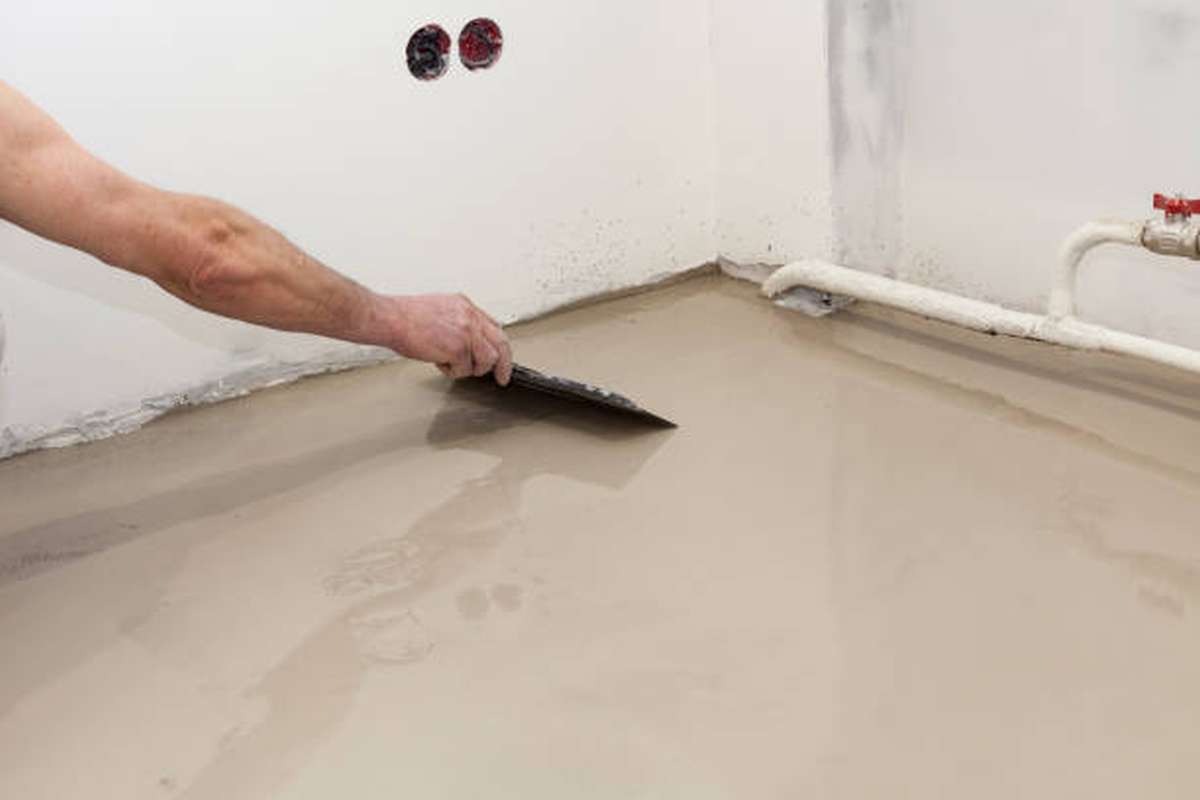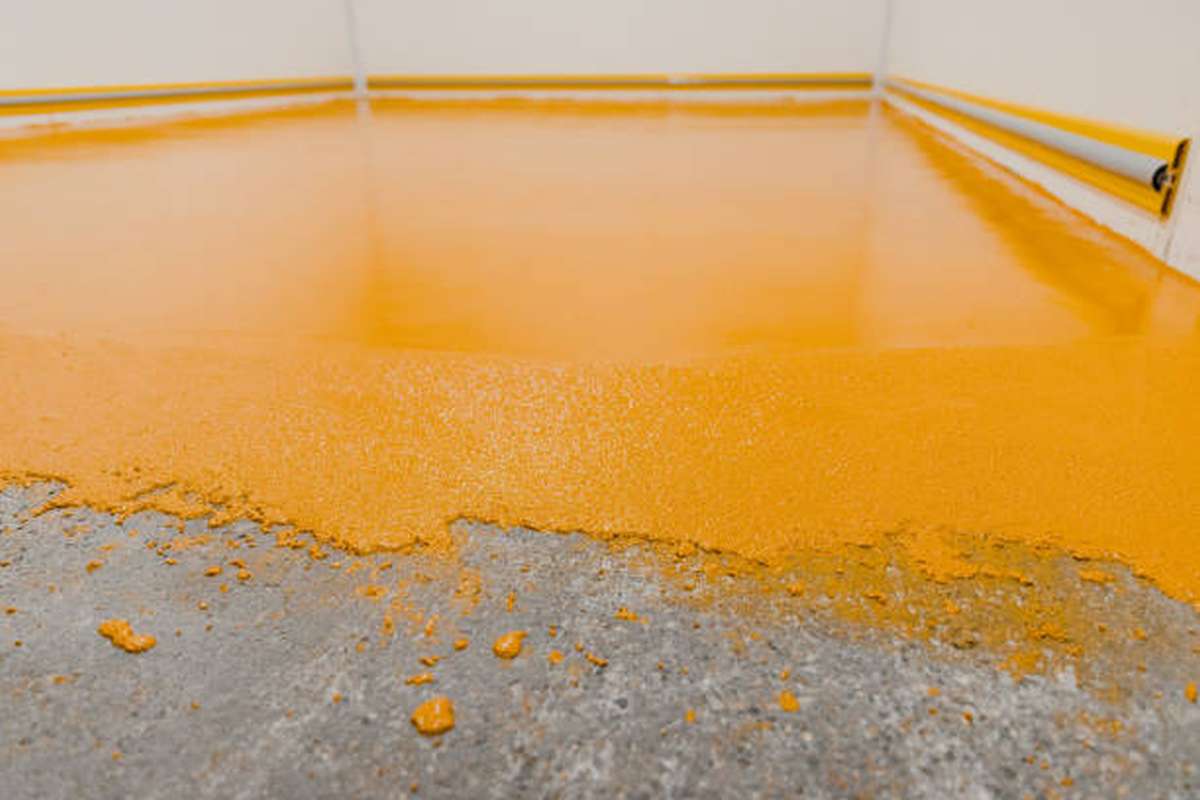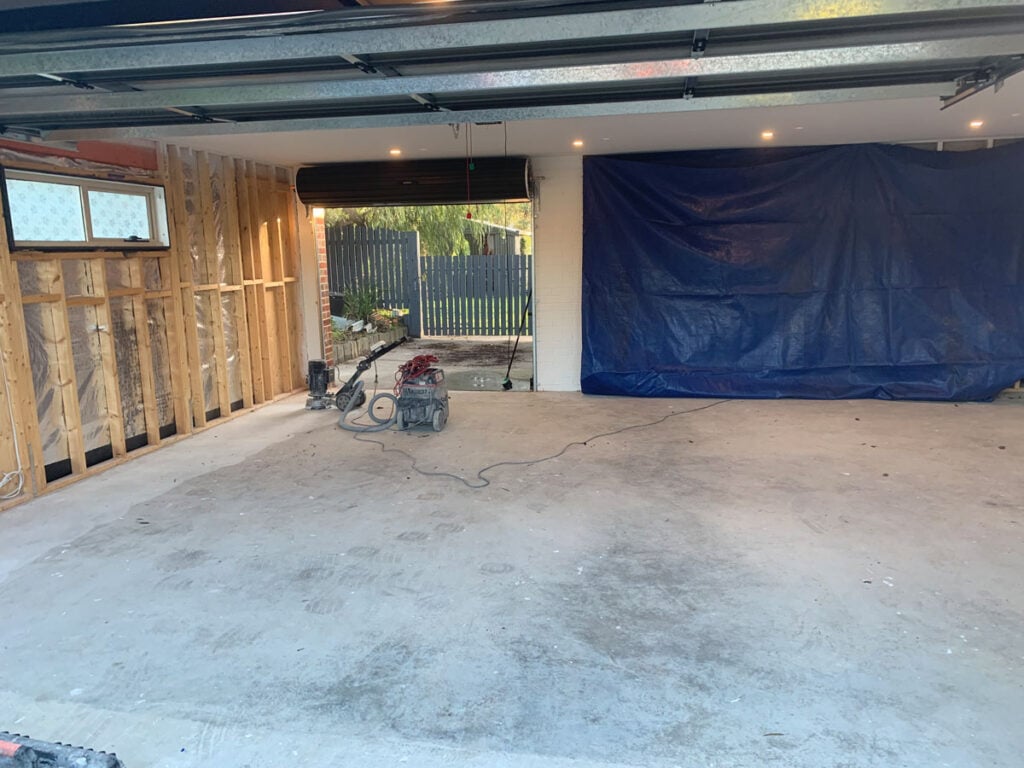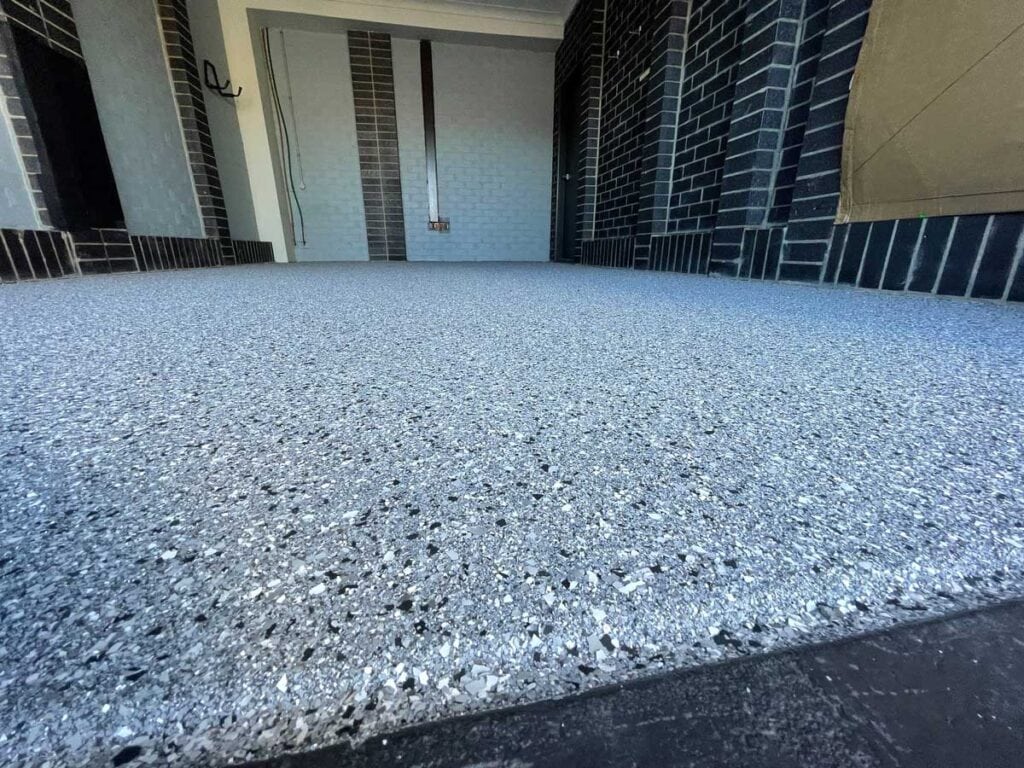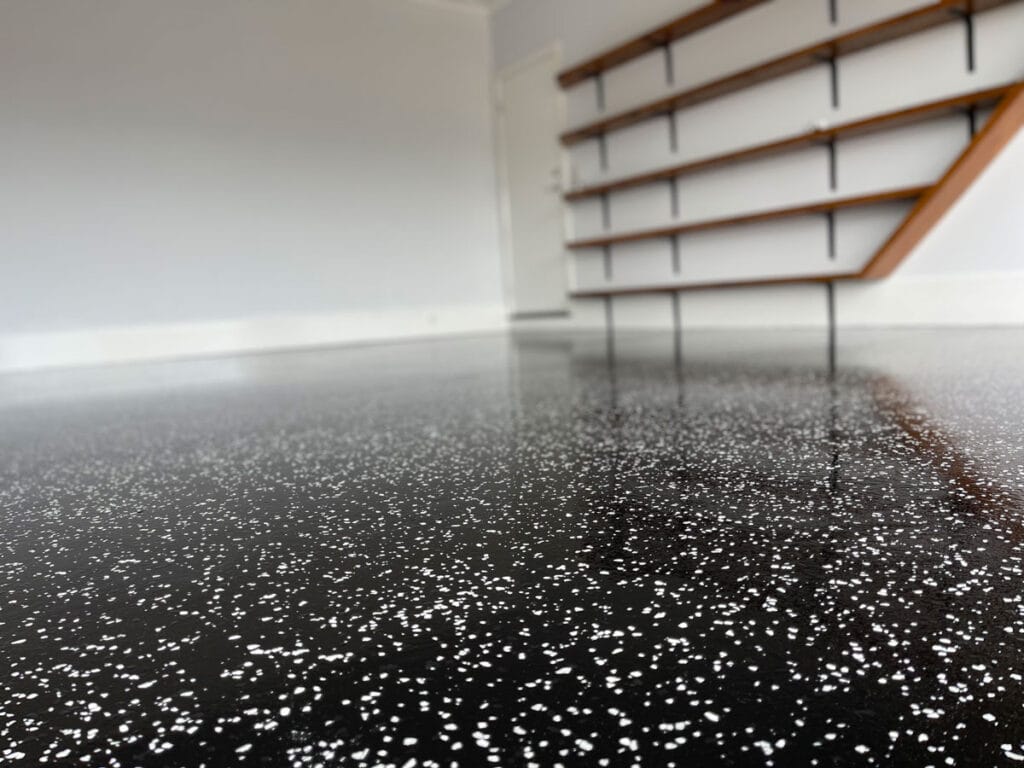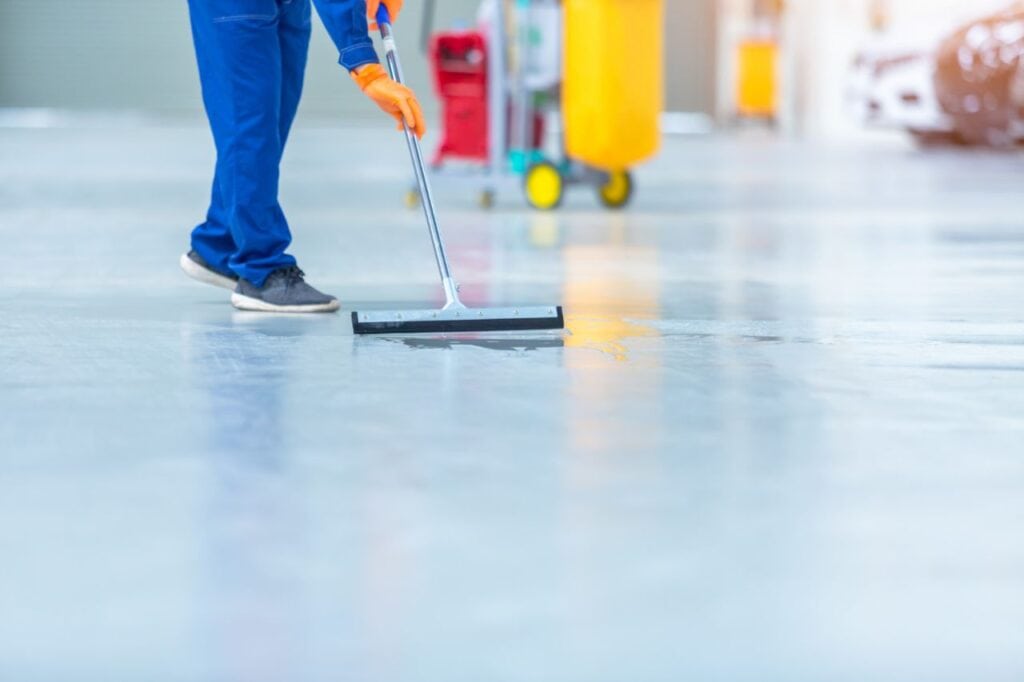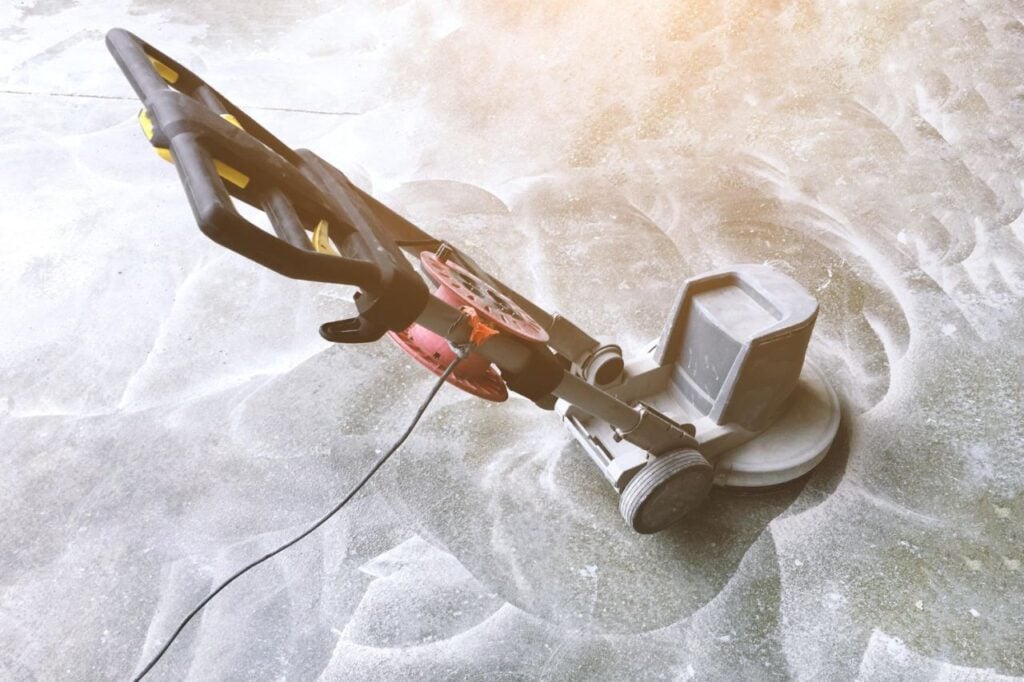You may make a remarkable first impression in your bathroom by installing epoxy flake flooring. You may find the perfect complement for your bathroom with this flooring option because of its durability, water resistance, and vast variety of colours and styles.
Epoxy, a resin typically used to cover and seal, can be a great option for bathroom flooring. It's a hardy, long-lasting surface that's impervious to water and simple to keep clean.
Bathrooms are ideal places for the inexpensive epoxy flake flooring. The many benefits it offers and the variety of colours available make it an easy choice for bathroom remodelling.
Epoxy can protect the grout in an existing tile floor in a bathroom from water damage. Additionally, epoxy can help protect the underlying concrete from water damage if you have an open shower design without walls or curtains. Epoxy is also compatible with plywood subfloors.
However, before choosing epoxy for your bathroom floor, it is important to understand the installation process. While it's true that most people can install epoxy flooring with only a few simple tools, it's vital to remember that there are many distinct kinds of epoxy, each with its own special needs. If you use the incorrect product, you could end up damaging your floor or even cracking the epoxy over time.
Planning to Put Epoxy on Your Bathroom Floor?
Epoxy flooring is a widely chosen option for bathroom floors due to its waterproof properties and ease of cleaning. If you're considering installing epoxy flooring in your bathroom, it's essential to remember the following tips:
When epoxy bathroom floors get wet, they can be dangerously slippery, so add a non-slip coating to the surface.
Epoxy flooring comes in a variety of colours and finishes, so you can pick the one that looks best in your bathroom.
When considering the installation of epoxy bathroom flooring, it is crucial to ensure that the surface is properly prepared. To achieve this, it is recommended to diamond grind the concrete, as it ensures a clean, dry, and debris-free surface.
If you are still determining whether epoxy flooring suits your bathroom, seeking guidance from a professional installer is advisable. They possess the expertise to assess your specific needs, recommend the most suitable flooring type, and provide installation services.
Epoxy flooring is highly recommended for public toilet applications. These floors can withstand the constant foot traffic and moisture typically found in public restrooms, regardless of the level of wetness or the volume of people using them.
Why Should You Prefer Epoxy Floors In Bathrooms?
Selecting the appropriate flooring for a bathroom renovation can be a daunting decision. However, an increasing number of homeowners are opting for epoxy flooring due to its numerous advantages. Here are some of the primary benefits of using epoxy flooring in bathrooms:
- Durable: Epoxy flooring exhibits exceptional durability, enabling it to withstand high levels of foot traffic, moisture, and chemical exposure. This quality makes it an excellent choice for bathroom floors, which often face moisture-related challenges and frequent use.
- Easy to clean: Epoxy flooring boasts effortless cleaning and maintenance, rendering it highly practical for busy homeowners. Any spills or messes can be easily wiped away with a damp cloth, restoring the floor's pristine appearance in no time.
- Non-slip: An additional advantage of epoxy flooring is its non-slip nature, ensuring enhanced safety for bathroom floors. This aspect is particularly crucial for households with young children or seniors, who may be more susceptible to slipping and falling in bathroom environments.
In addition to the advantages above, epoxy flooring provides an array of design possibilities. With a wide selection of colours, patterns, and textures available, finding an epoxy flooring style that harmonizes with your bathroom decor is effortless. Whether you desire a contemporary and streamlined appearance or a more classic aesthetic, an epoxy flooring option is available to cater to your preferences.
If you're contemplating a bathroom renovation, considering epoxy flooring as a viable choice is worthwhile. It possesses durability, easy maintenance, and slip resistance and offers versatile design options that align with your personal style preferences.
Is Epoxy Good For Shower Floor?
Epoxy is an excellent option for bathroom floors due to its durability, non-porous nature, and ease of cleaning. Its slip-resistant surface provides comfort and minimizes stress on the feet and joints. Moreover, epoxy flooring demonstrates resistance against chemicals and stains, making it an ideal choice for bathrooms.
Cleaning an epoxy-coated bathroom floor is effortless, as using a mop is usually sufficient. The epoxy coating repels water, preventing it from seeping into the concrete or grout lines.
When it comes to tiled showers, applying epoxy serves as a highly durable and long-lasting grout sealer. This simplifies tile cleaning and helps maintain their pristine appearance for an extended period.
Things to Consider
Epoxy resin flooring: A durable and worthwhile investment
One of the most pricey materials for bathroom flooring is epoxy resin. The greater price tag is more attributable to the time and effort put into building it than to any additional selling price. Epoxy resin flooring may be more expensive initially, but its long life span makes it a worthy investment. It's a good idea to invest in this flooring because it will last for a very long time compared to other options.
Temporary inconvenience during installation
Please be aware that the floor will be unavailable for the duration of the epoxy resin flooring installation process. This means that you will be unable to use your bathroom. If you have access to a second bathroom, you can easily deal with this problem. However, before settling on a flooring material, it is important to think about this to avoid any complications.
The importance of proper surface preparation
Cleaning the concrete base of any dust is essential for the epoxy resin tiles to adhere properly. If you want the greatest results without the hassle of fixing a sinking floor, hiring professionals is the way to go. Taking the time to properly prepare the surface ensures the tiles will adhere to the floor for the long haul.
Enhancing safety with non-slip coatings
Applying a non-slip coating to the epoxy resin floor of your bathroom is a great way to increase safety in the space. This is crucial because damp polymer oxide flooring can be quite dangerous. Taking this approach will make the bathroom a safer place to use by reducing the likelihood of slip and fall accidents.
Customising your bathroom aesthetics
You can choose the polymer oxide flooring that best suits the style of your bathroom from a broad variety of colours and textures. Whether you're going for a rustic, country vibe or a more contemporary, urban aesthetic, there's a colour and finish out there for you.
Surface preparation for epoxy bathroom flooring
Epoxy resin flooring in the bathroom requires careful surface preparation before installation. To accomplish this, the concrete subfloor is diamond ground to remove any moisture and dust. By taking the time to properly prepare the surface, you can lay a solid foundation for the epoxy resin flooring, extending its life and improving its functionality.
Seeking professional advice for decision-making
Epoxy resin flooring is a popular option for bathrooms, but if you have any doubts about its suitability, you should talk to an expert installer. Their insight and experience will help you make a well-informed choice. They can take a look at your bathroom, figure out what you need, and advise you on the best epoxy resin flooring option.
Ideal for public toilets
Public restrooms are an ideal setting for an epoxy resin floor. Whatever the level of moisture or activity on the floor, its sturdy construction allows it to endure the high foot traffic and moisture typically found in such facilities. Epoxy resin flooring is a great option for public restrooms since it is long-lasting and can tolerate high foot traffic.
What’s the Best Epoxy to Use on the Floor of a Shower?
A wide range of epoxy options are available, each with its advantages and disadvantages. However, when it comes to using epoxy in the shower, no particular epoxy is superior to others.
In other words, whether you choose epoxy for your shower or bathroom floor, the performance and quality will be equally good. So, if you are drawn to having a stunning and hassle-free shower floor that is a captivating focal point, it's time to explore your local stores that offer epoxy products.
Resistance to Water and Moisture
When selecting flooring for your bathroom, it is crucial to prioritize materials resistant to water and moisture. In this regard, epoxy flooring is an excellent choice due to its exceptional water and moisture resistance.
The impermeable nature of epoxy flooring prevents water from permeating through its surface, making it highly suitable for bathroom environments. Additionally, the smooth surface of epoxy flooring helps to prevent water from pooling or accumulating, reducing the potential hazards of slips and falls.
- Epoxy flooring is an ideal choice for bathrooms that experience high moisture levels, as it can effectively withstand moisture without warping or buckling. This makes it particularly suitable for bathrooms with inadequate ventilation or areas prone to high humidity.
- Furthermore, epoxy flooring exhibits remarkable resistance to the growth of mould and mildew. This quality simplifies the cleaning and maintenance process and ensures a hygienic bathroom environment.
- Additionally, epoxy floors are highly durable and long-lasting, as they can endure frequent exposure to water and cleaning chemicals. This resilience contributes to their longevity and makes them a reliable bathroom flooring option.
It is important to recognize that the installation process can influence the effectiveness of water and moisture resistance in epoxy flooring. Water can penetrate these areas if the surface or edges have gaps or bubbles, potentially leading to floor damage. Therefore, it is crucial to have experienced professionals handle epoxy flooring installation to ensure proper sealing and installation techniques are applied. This helps to minimize the risk of water seepage and ensures the longevity and effectiveness of the flooring in maintaining its water-resistant properties.
Can You Epoxy Over Bathroom Tile?
You can apply epoxy if the bathroom tiles are clean, dry, and securely adhered to the substrate. It is important to ensure that the tiles are not loose or cracked. Additionally, using high-quality epoxy is recommended for best results. In case the tiles are porous, it may be necessary to apply a primer before applying the epoxy.
This process is relatively straightforward when dealing with flat tiles with a low porosity level and in good condition. However, it's worth noting that any existing damage on the tile surface may pose challenges when applying an epoxy floor coating over them. It's important to address any issues with the tiles before proceeding with the epoxy installation.
Easy Cleaning and Maintenance for Epoxy Flooring
One of the best things about epoxy flooring in bathrooms is how easy it is to clean and take care of. Here are some explanations:
- Because epoxy flooring is seamless, there are no gaps or spaces where dirt and grime can build up. This makes it easier to clean and maintain because there are no hard-to-reach spots where dirt can build up.
- Because epoxy flooring is not porous, it is hard to stain or spill on. This is a great benefit for bathrooms, where things often get spilt or splattered. It's easy to clean up any spills with a mop or a cloth.
- Epoxy flooring is also resistant to bacteria and other pathogens, making it a great choice for bathrooms where cleanliness is paramount.
How Do You Put Epoxy Flooring in a Bathroom?
- Step one is to get ready. The floor needs to be clean and ready for the procedure to work. If you need to resurface tiles, you should first talk to your favourite flooring professional. If you click that link, you can learn more about putting epoxy over tiles. Before the epoxy finish is put on, the floor's base should be evened out.
- Make sure the base is clean to avoid a distorted sound. Often, a layer of primer is put on the floor to help the epoxy stick to it, and how the epoxy floor coating is put on depends on the finish.
- Bubbles are put all over the stage to make a flat surface. We had to wait until it looked like it was getting better. Even if there isn't any water in the mixture when the epoxy is put on, it will stick well and harden.
- So, the epoxy flooring surface will be bright, dry, and won't soak up water. Use a surface with different textures on the floor to make walking easier and prevent slips and falls.
Conclusion
Epoxy flooring is ideal for bathrooms since it is long-lasting, resistant to water, and comes in a wide range of colours and designs. It can shield both grout and concrete from the damaging effects of water because it is waterproof and easy to clean. Here are some things to keep in mind when laying down an epoxy floor: Put down a non-slip layer, diamond grind the concrete, and consult an expert installer. The use of epoxy flooring in public restrooms comes highly recommended. Bathrooms benefit greatly from epoxy flooring due to its resilience, cleanliness, and lack of slipperiness.
Because of its slip-resistance, resilience to chemicals and stains, and cleanability, it is also a great choice for shower floors. It is also great for tiled showers because it is long lasting, water resistant, and simple to maintain. Epoxy flooring is great for bathrooms since it is impervious to moisture, stains, and chemicals. Epoxy resin flooring is a smart choice for any bathroom because of its longevity and value. It's pricey to buy, but it will last for many years, so it's money well spent.
The subfloor of the concrete slab must be diamond ground to remove moisture and dust before installation. The bathroom's epoxy resin floor is ideal for applying non-slip coatings to improve safety and provide a unique look. Diamond grinding the concrete subfloor eliminates moisture and dust. Although epoxy resin flooring is more used in bathrooms, homeowners should still consult experts before making a final choice. Because of its durability and ability to withstand heavy use, it is perfect for use in public restrooms.
Because of its strong moisture resistance, it is also a great material for use as a shower floor in wet environments like bathrooms. Epoxy floors are dependable because they are long-lasting and resistant to wear and tear, making them a good choice for the bathroom. If you want your epoxy flooring sealed properly and installed correctly, it's best to leave the job to pros. The tiles must be spotless, dry, and firmly attached to the subfloor before installation. Epoxy flooring is low-maintenance since there are no cracks or crevices for dirt and grime to accumulate in.
Epoxy flooring's non-porous nature makes it simple to clean and maintain. Because of its resistance to bacteria and other infections, it is an excellent material for use in restrooms. The floor in a bathroom must be clean and dry for the epoxy flooring installation process to be successful. The floor is primed so that the epoxy will adhere to it, and the stage is levelled by covering it with bubble wrap. When applied without water, epoxy still bonds strongly and cures quickly.You may make a remarkable first impression in your bathroom by installing epoxy flake flooring. You may find the perfect complement for your bathroom with this flooring option because of its durability, water resistance, and vast variety of colours and styles.
Epoxy, a resin typically used to cover and seal, can be a great option for bathroom flooring. It's a hardy, long-lasting surface that's impervious to water and simple to keep clean.
Bathrooms are ideal places for the inexpensive epoxy flake flooring. The many benefits it offers and the variety of colours available make it an easy choice for bathroom remodelling.
Epoxy can protect the grout in an existing tile floor in a bathroom from water damage. Additionally, epoxy can help protect the underlying concrete from water damage if you have an open shower design without walls or curtains. Epoxy is also compatible with plywood subfloors.
However, before choosing epoxy for your bathroom floor, it is important to understand the installation process. While it's true that most people can install epoxy flooring with only a few simple tools, it's vital to remember that there are many distinct kinds of epoxy, each with its own special needs. If you use the incorrect product, you could end up damaging your floor or even cracking the epoxy over time.
Content Summary
- Epoxy flake flooring makes a remarkable first impression in bathrooms with its durability, water resistance, and variety of colors.
- Epoxy flooring is a hardy and long-lasting option for bathroom floors that is impervious to water and easy to clean.
- Epoxy flake flooring is an inexpensive choice for bathroom remodeling with numerous benefits and a wide range of colors available.
- Epoxy can protect grout and underlying concrete from water damage in bathrooms, especially in open shower designs.
- Understanding the installation process is important when choosing epoxy for bathroom floors to avoid damaging the floor or cracking the epoxy over time.
- Epoxy flooring in bathrooms offers waterproof properties, ease of cleaning, and non-slip characteristics.
- Non-slip coatings should be added to epoxy bathroom floors to prevent dangerous slipperiness when wet.
- Epoxy flooring comes in various colors and finishes, allowing customization for bathroom aesthetics.
- Proper surface preparation, such as diamond grinding the concrete, is crucial for installing epoxy bathroom flooring.
- Seeking guidance from professional installers can help in choosing the right epoxy flooring for bathrooms and ensure proper installation.
- Epoxy flooring is highly recommended for public toilets due to its ability to withstand moisture and foot traffic.
- Epoxy flooring is durable, easy to clean, and non-slip, making it an excellent choice for bathroom floors.
- Epoxy flooring provides an array of design possibilities, allowing customization for different bathroom styles.
- Epoxy serves as a durable grout sealer for tiled showers, simplifying tile cleaning and maintenance.
- Epoxy resin flooring is a durable and worthwhile investment, offering a long lifespan compared to other options.
- Temporary inconvenience during installation should be considered, as the bathroom will be unavailable during the process.
- Proper surface preparation is essential for the adhesion and longevity of epoxy resin flooring.
- Applying non-slip coatings enhances safety on epoxy resin bathroom floors, reducing the risk of slip and fall accidents.
- Epoxy flooring offers customization options to match the bathroom's style, with a variety of colors and textures available.
- Surface preparation is necessary for installing epoxy flooring in bathrooms, including diamond grinding the concrete subfloor.
- Seeking professional advice from installers can help in making an informed choice about epoxy resin flooring.
- Epoxy resin flooring is ideal for public toilets due to its ability to withstand high foot traffic and moisture.
- No particular epoxy is superior to others for shower floors, as all perform equally well.
- Epoxy flooring is highly resistant to water and moisture, making it an excellent choice for bathrooms.
- Epoxy flooring prevents water from seeping through the surface, reducing the risk of slips and falls.
- Epoxy flooring withstands moisture without warping or buckling, making it suitable for bathrooms with high humidity or inadequate ventilation.
- Epoxy flooring is resistant to mold and mildew growth, ensuring a hygienic bathroom environment.
- Proper installation techniques are crucial for maintaining the water-resistant properties of epoxy flooring and minimizing the risk of water damage.
- Epoxy can be applied over bathroom tiles if they are clean, dry, and securely adhered to the substrate.
- Epoxy flooring in bathrooms is easy to clean and maintain due to its seamless, non-porous surface that repels stains and bacteria.
Frequently Asked Questions
Moisture is one of the factors that cause epoxy flooring to peel. After washing your floor, allow it to dry. Let it sit for at least 24 hours before a professional applies new resin after washing your concrete flooring.
Cleaning the floor at least once a year can bring back its shine. You can do this by hosing the floor with hot water and then using a squeegee to dry it. Doing so will eliminate any cloudiness on your epoxy floors. For spots, you can spray them with an all-purpose cleaner and then wipe them using a soft cloth.
A good epoxy patching kit can replace mortar to speed up this process. If the damage is far more extensive than a handful of minor cracks and chips, you may need to take more extreme measures to repair the flooring. You'll need to resurface the entire area before applying new epoxy.
Epoxy flooring is long-lasting and highly durable. It is five times thicker than normal paint, is waterproof, and has excellent abrasion and chemical resistance, extending its life and durability.
Resinous garage floor coatings like epoxy, polyuria, and polyurethane are non-porous, so the surface tends to be extremely smooth. Although this type of surface works fine when dry, it becomes slippery, which can pose a threat by introducing water, oils, or mud.
